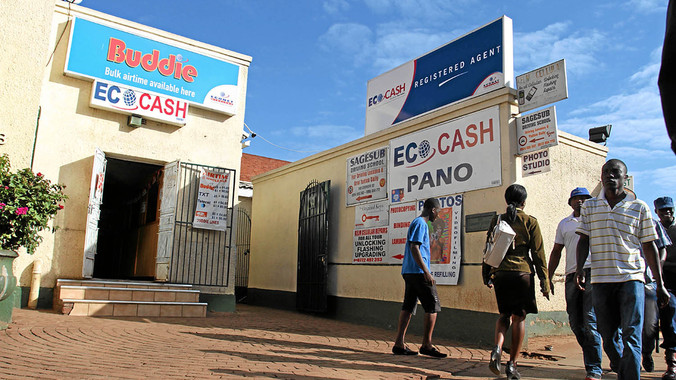



EcoCash is an innovative mobile payment solution that enables Econet customers to complete simple financial transactions such as sending money to loved.
LAST week Zimbabwe attracted the attention of the world following the awarding of the Best Mobile Payment Solution Award to Econet Wireless and Mahindra Comviva for EcoCash at the 22nd Global Mobile Awards (Glomo).
Mobile World Congress is the world’s largest annual gathering for the mobile industry, organised by the GSMA in the Mobile World Capital Barcelona. This years’ event was held from February 27 to March 2 2017.
The development which comes at a time when the country has generally been receiving gloomy world headlines (real and perceived) must give every objective minded Zimbabwean every reason to celebrate beyond Econet Wireless itself. As a country we indeed demonstrated to the world beyond doubt that despite the challenges that we might be facing as a country, we still have the acumen to innovate and find local solutions to take us out of the woods.
The rise of mobile money in Zimbabwe has proved very popular over the years, as financial institutions and telecoms have come up with different packages, fundamentally changing the way people do business to pay for goods and services using cell phones.
Mobile Banking has impacted positively to the financial inclusion in Zimbabwe. Financial inclusion is the delivery of financial services at affordable cost to sections of disadvantaged and low income segments of the society. In addition, the government has demonstrated its commitment to this cause having launched the National Financial Inclusion Strategy (NFIS) last year. The Strategy seeks to increase the delivery of financial services within the country from 69 percent in 2014 to 90 percent in 2020.
Some of the products that have brought convenience to the market include Textacash (CABS), Mobile Banking (CBZ Bank), OneWallet (NetOne), GetCash Wallet (GetCash), TeleCash (Telecel), Mobile Moola (FBC). Others are now defunct after the collapse of their parent institutions and these include CellCard (Kingdom Bank), Cybercash (Interfin Bank) and eMali (Tetrad).
No one wants to be reminded about the hyperinflation period we experienced as a country in the late 1990s and the resultant Zimbabwe dollar currency collapse before we switched to United State dollar (US$). Zimbabwe formally entered hyperinflation in March 2007 when month-on-month inflation reached 50,54 percent and year-on-year 2,200 percent (RBZ, 2007). People’s hard-earned savings were wiped away by inflation.
The launch of EcoCash in 2011 was a game changer and a welcome development for our country as it eliminated the need for cash by enabling digital payments using a mobile wallet. To realize ‘cashless-Zimbabwe’ vision, EcoCash “broke-the-cash-cycle” approach aimed at digitizing all cash transactions.
To date, EcoCash has become the leading digital payments service in Zimbabwe with over 6,5 million subscribers, more than 26 000 agents and has transacted over US$16 billion in the last four years. This is a huge achievement for a platform that has been in existence for only just over five years.

Econet Wireless founder Strive Masiyiwa spoke in a keynote discussion at this years congress.
According to Econet’s website, EcoCash is defined as an innovative mobile payment solution that enables Econet customers to complete simple financial transactions such as sending money to loved ones, buying prepaid airtime for themselves or other Econet subscribers and paying for goods and services.
Prior to the launch of EcoCash mobile money, who imagined that citizens from all corners of Zimbabwe can access their cash without the need to travel to the bank? From Mudzi, Binga, Zvishavane, Plumtree, Mapinga, Rushinga, Murombedzi, United Kingdom, Canada just to mention a few examples people can now move money from A to B in seconds at the touch of phone buttons.
The success of EcoCash has principally been based on Econet’s innovative solutions. Ecocash must be commended for transforming the financial landscape in Zimbabwe, having integrated with several banks, and breaking into the unfamiliar territories like salaries coming through EcoCash and integration with several banks thereby increasing financial accessibility to the general populace of Zimbabwe and abroad.
More recently, the company introduced a facility that allows subscribers to open accounts and transact strictly in South African Rand, allowing customers to either Cash-In, Cash-Out or make payments to merchants and billers in Rand. This is in addition to another recent addition of EcoCash integration with ZESA for EcoCash.
However, EcoCash is currently presented with challenges that need radical swift of strategy if the platform is to remain relevant. At a time when liquidity challenges have worsened, I think Econet must radically expedite its model towards ‘cashless’ whilst at the same time ensuring the viability of their agents who have supported the company over the years.
With over 26 000 agents around the country, not mentioning downstream job creation facilitated by agents, this is a huge feat for our country which is experiencing unprecedented unemployment levels.
The potential for EcoCash still remains untapped particularly for macro payments. A case in point here is their masterpiece EcoCash Ta whose potential is yet to be really felt both in the formal and informal sector. The idea of EcoCash Ta is brilliant but to this date why should one struggle with say US$3 “trapped” in their EcoCash wallets when one can easily use it in kombis or at a local vegetable market in Mkoba.
The resistance from some service providers to use mobile money as a medium of transaction is understandable for as long as the ecosystem is still limited. Who wants to accumulate cash in their wallets but at the end of the day unable to use it? To illustrate my example, should a vegetable seller is able to accept EcoCash in Highfield, the whole ecosystem system from the Mbare wholesale market must likewise be able to accept EcoCash so that the cash circulates via phone without the need for physical cash. The seller must be able to go to a nearby tuck-shop to buy bread with EcoCash and the cycle goes on like that.
Elsewhere in the media, it was refreshing to read that Powertell will soon be selling ZESA token scratch cards to customers. This indeed is a welcome development given the challenges that we have faced several times where we fail to get the token after money is deducted on EcoCash. Whilst the scratch card idea is brilliant, its only shortfall is on 24/7 inaccessibility, an advantage that mobile money brings.
My challenge to EcoCash and all the other mobile money platforms is, If Powertel can sell scratch cards, why can’t you negotiate with ZESA to be advanced with the same token for customers to purchase the tokens say when Zesa system is offline? Simple payments like at Toll gates must be integrated on mobile money as well. This way, we deal with micro payment headaches motorists find themselves entrapped in.
In a totally cashless society, the focus that we are heading to as a country, Econet must protect their agents to remain viable by empowering them a merchants so that they are able to sell other stuff outside simple Cash-in and cash-outs. At the same, it is important that charges are kept at the minimal to attract interest.
EcoCash has undoubtedly sweated to become the household in Zimbabwe’s mobile money market, rising from scratch to firmly hold 98 percent market share. Whilst we cannot take anything away from EcoCash, we await with anxiety to see better competition coming from other players as this is not only healthy for the industry at large, but will keep the players at the top of their notch, giving us another chance of taking other accolades in the future. Reports of NetOne’s soon to be relaunched OneWallet mobile money platform comes to mind.
Well Done to EcoCash for keeping Zimbabwe on the world map.
